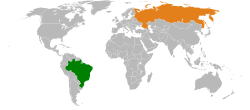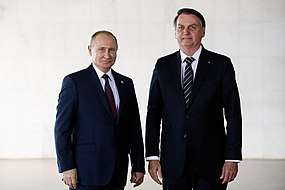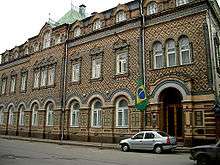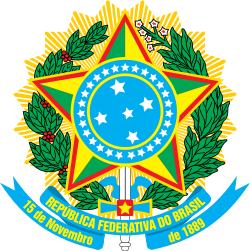Brazil–Russia relations
Brazil–Russia relations (Russian: Российско-бразильские отношения or Бразильско-российские отношения, Portuguese: relações russo-brasileiras) have seen a significant improvement in recent years, characterized by an increasing commercial trade and cooperation in military and technology segments. Today, Brazil shares an important alliance with Russia, with partnerships in areas such as space and military technologies as well as telecommunications.
 | |
Brazil |
Russia |
|---|---|

According to a 2017 Pew Global Attitudes Project survey, 35% of Brazilians have a favorable view of Russia, with 36% expressing an unfavorable view.[1]
History
The first diplomatic relations between Brazil and Russia started on October 3, 1828,[2] being the first South American country with which Russia formalized ties. In 1876, the Emperor of Brazil, Dom Pedro II, paid a private visit to Russia.
The diplomatic relations were interrupted twice: in 1917, after the October Revolution (being reestablished on April 2, 1945) and in 1947 due to the right-wing government of the military Eurico Gaspar Dutra (reestablished in 1961, during the government of Jânio Quadros).
Brazil maintained a neutral, but distant, relationship with the Soviet Union during the Cold War. Their bilateral relations were limited to commercial trade and cooperation agreements of minimal importance. In 1988, José Sarney made the first official visit of a Brazilian Head of State to the USSR.
With the fall of the Soviet Union and the subsequent birth of the Russian Federation, talks between the two nations increased. Brazil was one of the first countries to recognize the Russian Federation as the legal successor of the Soviet Union (December 26, 1991). In 1994, Celso Amorim made the first official visit of a Brazilian Foreign Minister to Russia.
Since then, bilateral relations between Russia and Brazil have been characterized by the positive dynamics of political contacts at all levels. In 1997 the Russian-Brazilian Commission of High Level of Cooperation (CAN) was created, headed by the Head of Government of the Russian Federation and the Vice-President of the Federative Republic of Brazil and regulated by the Brazil-Russia Cooperation Treaty, signed on November 21, 1997. Its operational mechanism is the Intergovernmental Cooperation Commission (CIC).
In June 2000 the two countries signed the Basic Agreement on partnership relations. In 2001, a high-level committee headed by then Vice-President of Brazil Marco Maciel, and then Prime minister of Russia Mikhail Kasyanov, established several long-term bilateral treaties, initiating a strategic partnership between the two countries, and creating the Brazilian-Russian Governmental Commission. In 2002, President Fernando Henrique Cardoso made an official visit to Russia, when the "Strategic Partnership" between the two countries was celebrated. The following year, Minister of Foreign Affairs Igor Ivanov visited Brazil.
Continuing that path, another Vice-President of Brazil, José Alencar, traveled to Moscow in September 2003, to meet with Russian President Vladimir Putin and his senior cabinet members. The two countries signed the Brazil-Russia Military Technology and Transfer Pact, an important agreement in the area of space technology, missile defense, and military weapons transfer.
In response to an invitation made by then Brazilian President Luiz Inácio Lula da Silva, Vladimir Putin made a state visit to Brazil on November 22, 2004, being the first visit of a Russian President in the history of bilateral relations, when the "Technological Alliance" was celebrated between the two countries. On October 18, 2005, during a state visit of President Lula to Moscow, Silva and Putin signed the bilateral Brazil-Russia Strategic Alliance, as well as an agreement that made it possible for the Brazilian Space Agency to send the first Brazilian astronaut, Marcos Pontes, into space aboard Soyuz TMA-8.
In 2006, Russian Foreign Minister Sergei Lavrov visited Brazil, when the Memorandum of Understanding for the Establishment of a Mechanism for Political Dialogue and Cooperation between Mercosur and the Russian Federation was signed. On November 26, 2008, during a state visit of then President Dmitry Medvedev to Brazil, the two countries signed agreements on visa exemption,[3] and cooperation in the aerospace, nuclear and defense industries.[4]
The second BRIC summit was held in Brasília, following the first in Russia.
In 2012 President Dilma Rousseff visited Russia. The following year, 185 years were completed since the establishment of diplomatic relations between Russia and Brazil. On this occasion the Russian Foreign Minister and his Brazilian counterpart exchanged messages of congratulations, emphasizing coincidence of positions in the international arena and importance of future development of cooperation. Both countries advocate observance of human rights, democratic values, respect for national sovereignty, primacy of international law, reform of institutes of global economic and financial governance, and consolidation of the central role of the United Nations Security Council.
In 2014 the President of Russia, Vladimir Putin, visited Brazil to participate in the VI BRICS Summit. The following year the Brazilian President, Dilma Rousseff, participated in the VII BRICS Summit in Ufá.
In 2017 the President of Brazil, Michel Temer, paid a visit to Russia. A series of acts were signed, including:
- Joint Declaration of the Federative Republic of Brazil and the Russian Federation on Strategic Dialogue for Foreign Policy;
- Political Consultation Plan Between the Brazilian Ministry of Foreign Affairs and the Russian Ministry of Foreign Affairs for 2018-2021;
- Memorandum of Understanding Between the Brazilian Ministry of Foreign Affairs and the Russian Ministry of Economic Development in the Area of Economic and Investment Cooperation;
- Protocol Between the Brazilian Ministry of Development, Industry and Foreign Trade and the Russian Federal Customs Service on Cooperation, Information, Exchanges and Mutual Assistance about the Uniform System of Tariff Preferences of the Eurasian Economic Union;
- Memorandum of Understanding between the Brazilian Federal Revenue Secretariat, the Brazilian Ministry of Finance, and the Russian Federal Customs Service on the Exchange of Information on Goods and Vehicles Circulating between the Federative Republic of Brazil and the Russian Federation.[5]
Current relations

In recent years, the relationship between the countries has been significantly narrowed through visits by senior officials, multilateral dialogue (UN, G-20, BRICS), increased trade and cooperation, especially in aerospace and technical-military matters. Brazil and Russia are "Strategic Partners and Technological Allies".
The two countries are committed to achieving US$10 billion in trade. In 2012, the bilateral exchange registered almost US$6 billion. The number of Brazilian companies installed in Russia has grown significantly. Cooperation in sanitary and phytosanitary matters has advanced, benefiting the trade in meat - Russia is one of the largest importers of beef and pork produced in Brazil.
Brazil and Russia have converging positions on many issues on the international agenda, sharing the conviction that it is necessary to reform the structures of global governance, with a view to building an institutional architecture more consistent with the contemporary world.
The consolidation of the BRICS grouping is one of the axes of relations between Brazil and Russia. Initially seen as a purely economic concept, BRICS presents itself today as a platform for political coordination in proposing solutions to international challenges. Both countries are committed to advancing two BRICS cooperation projects - the New Development Bank and the Contingent Reserve Arrangement.
Cultural cooperation is also an important aspect of the bilateral relationship. Since 2008, annual editions of the Brazilian Film Festival have been held in Russia. Russia has contributed to the training of Brazilian dancers, within the framework of the partnership created when the Bolshoi Ballet School branch opened in the city of Joinville (2001). The prospect of expanding the network of Portuguese and Russian languages in the main Russian and Brazilian universities demonstrates the growing mutual interest of students.
In December 2018, three Brazilian technology parks visited Moscow in order to create avenues for the internationalization of Brazilian startups in Russia. This initiative was part of the Innovation Diplomacy Program of Itamaraty, which has stimulated the creation of the BRICS's Network of Parks and Business Incubators.[6]
Brazil has an embassy in Moscow and Russia has an embassy in Brasilia.
Common membership in international organisations
BIS • BRICS • IAEA • IBRD • ICAO • ICRM • IDA • IFC • IFRCS • IHO • ILO • IMF • IMO • Inmarsat • Intelsat • Interpol • IOC • IOM • ISO • ITU • LAIA • NSG • PCA • UN • UNCTAD • UNESCO • UNHCR • UNIDO • UNITAR • UNTAET • UNWTO • UPU • WCO • WHO • WIPO • WMO
References
- "Publics Worldwide Unfavorable Toward Putin, Russia". Pew Research Center. November 30, 2017.
- "Biblioteca Mário de Andrade recebe "Um Domingo na Rússia"". Prefeitura de São Paulo (in Portuguese). 14 November 2018. Retrieved 15 November 2018.
- RT Today,Russia and Brazil agree to visa-free travel Archived January 16, 2009, at the Wayback Machine, 26.11.2008
- Reuters, Russia's Medvedev in Brazil, aims to double trade, 25.11.2008
- "History of Russia-Brazil Relations".
- "Brazil-Russia Relations (Brazilian Ministry of Foreign Affairs)".
Further reading
- Hershberg, James G. 2020. "Soviet-Brazilian Relations and the Cuban Missile Crisis." Journal of Cold War Studies.
- "The Return of the Bear? Russian Military Engagement in Latin America: The Case of Brazil". Military Review. Dall'Agnol, A. C.; Zabolotsky, B. P.; Mielnieczuk, F. (2018).
- "As Relações Russo-Brasileiras" (PDF) (in Portuguese). Revista Brasileira de Política Internacional. Archived from the original (PDF) on 2007-09-27. Retrieved 2007-05-06.
- "Aliança com a Rússia" (in Portuguese). Defesa BR. Archived from the original on 2012-03-02. Retrieved 2007-05-06.
- "The Magazine of Future Warfare". World Powers. Archived from the original on 2007-04-22. Retrieved 2007-05-06.
External links
| Wikimedia Commons has media related to Brazil–Russia relations. |
- The Sino-Brazilian Principles in a Latin American and BRICS Context: The Case for Comparative Public Budgeting Legal Research Wisconsin International Law Journal, 2015
- (in Russian) Informational Project about Brazil
- (in Portuguese) Russian Embassy in Brasília
- (in English) Ministry of Foreign Relations of Brazil
- (in Russian, Portuguese, and English) Brazilian Embassy in Moscow

